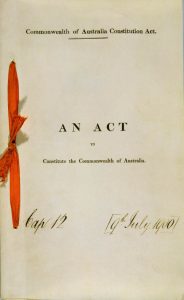 Nicholas Aroney is a Professor of Constitutional Law at The University of Queensland. He is a Fellow of the Centre for Public, International and Comparative Law, a Research Fellow of Emmanuel College at The University of Queensland, a Fellow of the Centre for Law and Religion at Emory University,and an External Member of the Islam, Law and Modernity research program at Durham University
Nicholas Aroney is a Professor of Constitutional Law at The University of Queensland. He is a Fellow of the Centre for Public, International and Comparative Law, a Research Fellow of Emmanuel College at The University of Queensland, a Fellow of the Centre for Law and Religion at Emory University,and an External Member of the Islam, Law and Modernity research program at Durham University
The Australian Constitution came into force on 1 January 1901. The Constitution gave effect to an agreement among the people of the six self-governing colonies of the Australian continent to form themselves into a federation.
Recognition of God and Religious Freedom
The preamble to the Constitution states, among other things, that the people agreed to unite in a federal commonwealth “humbly relying on the blessing of Almighty God.” When the Constitution was being drafted, several religious groups and denominations had advocated for the recognition of God in the Constitution [1]. Patrick Glynn, an Irish-Catholic delegate from South Australia, was its most articulate supporter. He put the case for a “simple and unsectarian” acknowledgement of God on the basis that religion is an important source of social cohesion. He said:
The stamp of religion is fixed upon the front of our institutions, its letter is impressed upon the book of our lives, and … its spirit, weakened though it may be by the opposing forces of the world, still lifts the pulse of the social organism. It is this, not the iron hand of the law, that is the bond of society; it is this that gives unity and tone to the texture of the whole; it is this, that by subduing the domineering impulses and the reckless passions of the heart, turns discord to harmony, and evolves the law of moral progress out of the clashing purposes of life… [2]
(more…)



